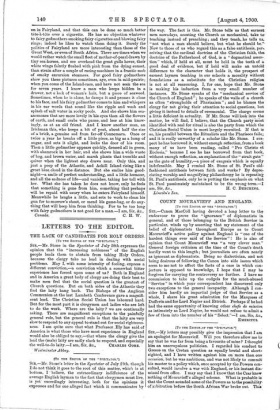(To TEE EDITOR OP VIZ "SPECTATOR.")
SlIti—MY. Stone's letter in the Spectator of July 23th, though tdo not think it goes to the root of this matter, which is at bottom, I believe, the extraordinary indifference of the average taglish-laynian to the fact that clergymen ninit live, is yet' exceedingly interesting, both for the opinions it expresses and for one alleged fact whiCh it communicates by - the way. The fact is this. Mr. Stone tells us that earnest men nowadays, scouting the Church as mechanical, take to teaching instead of preaching; and they teach, he tells us; "not what a man should believe, but what he should be:"- Now to those of us who regard this as a false antithesis, per ceiving that the cardinal doctrine of the Christian faith, the doctrine of the Fatherhood of God, is a "dogmatical asser- tion " which,. if held at all, must be held in the teeth of a good deal of evidence, but if held will make an untold difference to the character that holds it, the prospect of earnest laymen teaching in our schools a morality without foundations as a substitute for the Christian religion is not at all reassuring. I, for one, hope that Mr. Stone is. making his induction from a very small number of instances. Mr. Stone speaks of the "mechanical service. of the Church of England"; he speaks of the walls of a church as often "strongholds of Pharisaism " ; and he blames the clergy for not giving their attention to social questions, but giving it instead to details of ceremoniaL The charge seems a little deficient in actuality. If Mx. Stone will look into the matter, he will find, I believe, that the Church party most identified with zeal for ritual is also the party from which the Christian Social Union is most largely recruited. If that is so, his parallel between the Ritualists and the Pharisees fella; and it is really unworthy of a scholar like Mr. Stone. I see-. pect he has borrowed it, without enough reflection, from a book many of us have been reading, called "Pro Christo et ECclesia," because I see he has borrowed from that book, without enough reflection, an explanation of the "strait gate" as the gate of hiunility,—a piece of exegesis which is equally indefensible. May I remind Mr. Stone of St. Paul's old- fashioned antithesis between faith and works ? By deprer ciating worship and magnifying philanthropy he is repeating St. Paul's antithesis, only he is putting the emphasis on what St. Paul passionately maintained to be the wrong term.—I


































 Previous page
Previous page